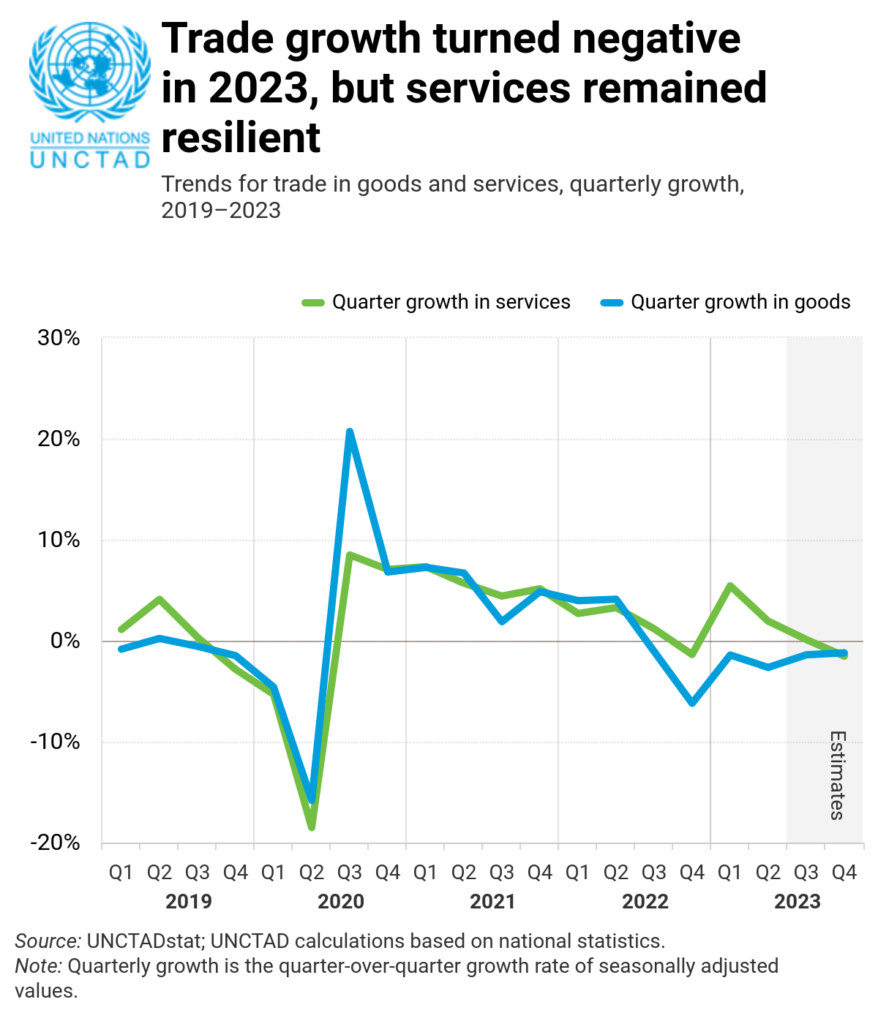Revolutionizing Global Trade: The Rise of TradeTech

TradeTech’s success hinges on collaborative efforts between businesses and governments, adapting regulatory frameworks to new tech and providing incentives. International cooperation is crucial for navigating complex challenges like tax and tariff issues. It’s more than a tech revolution; TradeTech catalyses positive change, fostering innovation, inclusive growth, and a prosperous future.
In the bustling metropolis of Abu Dhabi, amidst the vibrant nightlife and towering skyscrapers, a groundbreaking initiative is poised to reshape the landscape of global trade. On March 1, 2024, the World Economic Forum announced a landmark partnership with the United Arab Emirates (UAE) government on a transformative project known as TradeTech. This ambitious endeavour aims to harness the power of cutting-edge technologies to revolutionise international trade, marking a significant step towards a more efficient, inclusive, and equitable global trading ecosystem.
At its core, TradeTech represents a strategic alliance between the UAE government and the World Economic Forum, with the shared goal of accelerating digitalisation and technology adoption in trade practices. Spearheaded by His Excellency Dr. Thani bin Ahmed Al Zeyoudi, the UAE’s Minister of State for Foreign Trade and Chair of the 13th Ministerial Conference of the World Trade Organisation (WTO), TradeTech seeks to leverage innovation to overcome the mounting challenges facing global trade.
The Need for TradeTech
In recent years, geopolitical tensions and protectionist measures have cast a shadow over the world economy, leading to a decline in global trade volumes. The United Nations Conference on Trade and Development (UNCTAD) predicted a 5% drop in global trade, amounting to a staggering $1.5 trillion loss by the end of 2023. Against this backdrop of uncertainty, TradeTech emerges as a beacon of hope, offering a pathway towards revitalising international trade through technological innovation.
The TradeTech initiative encompasses a diverse array of cutting-edge technologies, including the Internet of Things (IoT), artificial intelligence, blockchain, and more. These innovations hold the potential to streamline trade processes, optimise supply chain management, and enhance the overall efficiency of global trade operations. By digitising and automating various stages of the trade journey, from manufacturing to distribution, customs clearance, and consumer delivery, TradeTech promises to significantly reduce time inefficiencies and lower transaction costs.

Source: United Nations
Moreover, TradeTech is not merely a technological venture; it is a holistic approach to innovation that fosters collaboration among key stakeholders. Industry leaders, technology providers, startups, and government officials converge within a cohesive global ecosystem, united by a shared vision of advancing trade through innovation. By nurturing promising startups and providing them with capital resources, TradeTech aims to cultivate a fertile ground for innovation and entrepreneurship in the trade sector.
The UAE, in an attempt to position itself as a future leader in forward-thinking policies and an innovation-friendly environment, serves as an ideal incubator for TradeTech’s transformative potential. As a global hub for trade and commerce, the UAE has long been at the forefront of pioneering initiatives that push the boundaries of innovation. With TradeTech, the UAE reaffirms its commitment to driving progress and fostering economic growth through technological innovation.
The Future of Trade
Already, TradeTech is making waves within the global trade community, sparking conversations and garnering support from industry leaders and policymakers alike. The TradeTech Forum, held on the sidelines of the WTO’s 13th Ministerial Conference, served as a platform for stakeholders to exchange ideas, share best practices, and chart the course for the future of trade.
Looking ahead, the success of TradeTech hinges upon concerted efforts from both businesses and governments. Regulatory frameworks must be adapted to accommodate technological innovations, while incentives should be provided to encourage the adoption of new technologies. Moreover, international cooperation is essential in addressing complex challenges such as tax and tariff complexities and navigating trade rules in the digital era.
Ultimately, TradeTech represents more than just a technological revolution; it is a catalyst for positive change within the global trade landscape. By embracing innovation and collaboration, stakeholders can unlock new opportunities, drive inclusive growth, and pave the way for a more prosperous future for all. As TradeTech takes centre-stage in Abu Dhabi, the world watches with anticipation, eager to witness the dawn of a new era in global trade.


